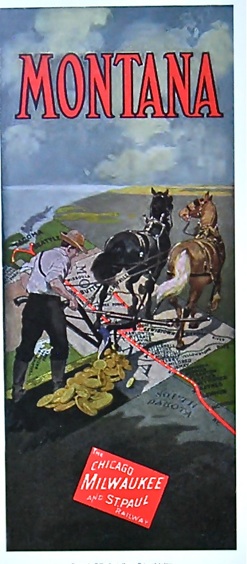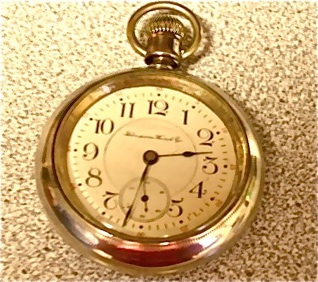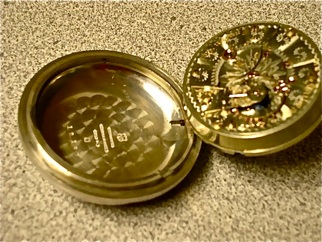Grandpa was a Cowboy






When I was a little girl I was enthralled to learn that my maternal grandfather (Frederick Heeck) had been a Cowboy. That thrill was tempered when he let me know that life was very hard and no, he didn’t have fancy guns and participate in shoot-outs. He WORKED hard on the Montana prairie, rounding up wild horses for the US Army Calvary.
Below is an excerpt a biography being written by my mother, Clarice Heeck Tingley, about her father.
The Watch
Clarice Heeck Tingley
copywrite June 2010

Fred journeyed to Dodson, Montana by train and rented a room in a small hotel. Then he went to the local saloon to get a drink of whiskey and information. It was there he met a man named Phil Doucette, who, in the next few days helped Fred stake a land claim and introduced Fred to his parents, who had a nearby farm. The Doucette family took Fred into their home, helped him build a shack on his claim and located jobs for him on surrounding farms through harvest time. By the fall, Fred had a little money in his pocket and he was back on a farm!
One Saturday night, in 1905, Phil and Fred were socializing in the Dodson saloon when an elderly lady came in. She spoke apologetically (nice women didn’t frequent saloons.) In her right hand she held a man’s pocket watch. She said her husband had retired from his job with the railroad, became ill very soon thereafter and died, leaving her destitute. As was common in that day, the only thing he received from the railroad company when he retired was his pocket watch. She remarked, “I can’t eat this watch!”

During the late 1800s and early 1900s, it was fashionable for a man to receive a watch fob made of a long lock of hair that was braided into leather strips from a female lover, fiancée, or wife. One end was attached to the watch winding mechanism and the other end fitted with a small clip or bar. The watch would be carried in a pocket on a vest or pants and the fob would drape across to a pocket on the opposite side of the garment. One of the few possessions Fred took to Montana was a long lock of his late wife’s blonde hair. He located a lady in Dodson who made braided fobs, and she agreed to make one for him. In just a few days, the lady finished the job and it was with feelings of pride and sentiment when he attached the watch and slipped it into his pocket and hooked the clip onto his vest.
Fred worked hard erecting fences, building a two-room house with a sod roof, and an outhouse, digging a well and taking care of a livery stable in Dodson. During wintertime he and his close friend Phil Doucette would roundup wild horses from the Montana mountains, break them, and either sell or keep them as part of their growing herd.
In the winter of 1910, Phil and Fred were in the mountains looking for a stallion that was stealing their brood mares. The day was becoming late so Fred reached for the fob to pull his watch form his pocket and see if it was time to make camp for the night. The fob came up empty – the watch was gone!
The two men traced and retraced the trails over which they had ridden that day! On the third day they concluded the search. A snowstorm was brewing and they had managed to capture the passionate stallion along with their mares. Fred and Phil agreed that The Stallion was an exceptional animal. Phil did not need any more horses, so Fred happily assumed ownership.
The laugh lines around Fred’s eyes deepened and his voice warmed with enthusiasm, as he related stories about The Stallion.
According to Fred, his newly acquired animal was between two and three years old, tall and healthy with “fire in his eyes and full of hell.” By evening the two men had “broken” The Stallion. Fred explained to Clarice that he rarely used a whip to train a horse. He believed patience and calm voice tones were the best tools.
The men prepared their camp for the night near some very large rocks, which made a wind break, and tethered The Stallion nearby. The two mares would naturally stay close to him. Shortly before day, Phil and Fred were awakened by the sounds of wild whinnies and stomping hoofs. The Stallion was smashing a very large rattlesnake that was slithering toward Fred’s bedroll. It, too, was searching for a warm place!
In 1914, Fred and Phil received a contract from the U.S. Army to supply a large quantity of horses suitably trained for the Cavalry. Each winter for the following three years they went into the mountains west of Havre, rounded up the required number of wild horses, corralled and trained them according to the Army specifications and by early summer shipped them on the railroad from Havre to specified destinations.

Fred took the watch to a jeweler who cleaned and oiled the 23 jeweled movement and it was Fred’s constant companion until he died in 1960.
Phil’s mother was a Native American lady and his father was a Frenchman from Canada. Mrs. Doucette sensed that Fred was not monastic by nature so she assumed the role of matchmaker. She introduced him to a beautiful young woman who lived on the Hungry Horse reservation. Fred was smitten; he had grieved long enough!
Fred’s romance was short-lived. The lovely lady invited him to visit her parents. Her mother was a Native American and her father was a Caucasian fur trapper. Fred’s fiancée insisted that they live on the reservation; but after the visit Fred knew that he could not live there and be happy. Consequently the couple came to an amicable understanding and ended the romance.
About 1918 a new interest entered Fred’s life. A family named Gunderson moved onto a nearby claim and the oldest daughter of the family staked another claim abutting Fred’s farm. Her name was Nora.
Nora Albertina Gunderson was born to John and Carrie (Olin) Gunderson on a farm in Rousseau County, Minnesota on May 20, 1895. John had been born in 1864 in Norway and immigrated to the US when he was 19. Carrie was born in Minnesota in 1870. When Nora was sixteen years old the family moved to Minot, North Dakota where she got her first job. She worked as a housekeeper and cook for a doctor’s family. Nora received board and room plus a small wage, most of which she shared with her family. In 1917, John Gunderson decided to move his family to Montana to stake a land claim; Nora did the same.
Nora’s homesteaded a piece of land between her parents’ claim and Fred’s farm. The she obtained a job in a small restaurant near the railroad depot in Dodson. A co-work named Josie became Nora’s close friend. Josie was engaged to marry a young man named Bob Harwood, who was a friend of Fred. The two couples soon developed a lifelong friendship. And naturally the Gunderson family engulfed Fred, land wise and romantically.
Fred had all the work he could handle. Besides his livery service and improvements to his farm, he and a friend decided to pool their savings and become the owners of the FIRST automobile agency in northeastern Montana. The car company was Star-Durant. Fred knew the horse-and-buggy days were ending.
Fred and Nora married in April of 1921 and on July 27, 1922, Clarice Marie, their first child, was born.
Clarice looked up from her lunch place and teasingly interrupted her father’s recollections, “Gee, Dad, you were finally achieving your goals: A large farm, a pretty wife, a gold watch in your pocket, a business in town, a remarkable stallion, and me!” Fred did not share Clarice’s humor and gruffly remarked, “You had better get going or you will be late for work.”
As she drove to work her conscience pricked her brain. There was still a portion of his life about which she was curious. She needed to listen as an adult and not allow their father/daughter relationship to interfere with the objectivity of his life-story. Tomorrow they would continue; she would be a better listener.
One noon, while Clarice and Fred were eating lunch, her mind was drawing a picture of a young man who was five feet eleven inches tall with dark brown thick hair, dark blue eyes and a lumpy nose. His grin revealed straight, good teeth stained from chewing tobacco. Fred was quite thin, had long legs and his back was very straight. He was not handsome but neither was he homely.
Suddenly, Clarice’s mind dropped its pencil and she paid attention to what Fred was saying - - something about a horse. “Dad, whatever happened to The Stallion?”
Fred threw her a look of disgust and resumed his recollection. “One afternoon, when you were about three weeks old, Nora wanted to drive to Dodson to visit friends and ‘show-off’ her baby. I hitched The Stallion to our buggy for her. Nora then placed you in a basket on the leather buggy seat. She returned to the house to get her purse. At that moment, something spooked The Stallion. Before I could grab the reins, he reared and took off! But you began to cry and he stopped. I ran the short distance to the buggy, grabbed the reins and drove him back to the house. Nora insisted I hitch a different horse to the buggy; she never used The Stallion again.”
Fred paused, frowned, and said “I never found out what spooked The Stallion that day. He was the best horse I ever had.”
As Clarice stood up from the table, Fred said sorrowfully, “That fall, during a bad storm, The Stallion was killed by a lightening bolt.” As she left the room she was thinking, “Despite his seventy-nine years, his white hair, and his sick body, his mind is clear and his back is still straight.”
In the summer of 1923 Fred moved his family to a rented house in Dodson because Nora was pregnant again and the little sod-roofed home was too small. The livery stable in town was slowly being converted to accommodate a small automobile showroom and repair garage. Part of the building still housed a stable for the horse-and-wagon delivery service.

Fred immediately rushed to the bank where he was informed that The Bastard had withdrawn ALL the partnership money. Since Fred had mortgaged the farm to build a business, he was now in a bad situation.
Farmers in the northeastern part of Montana were not doing well that year. Crops were poor, thanks to a drought, and the grain elevator in which Fred had invested some savings, was in the process of bankruptcy. Nora’s parents and siblings abandoned their farm and moved to Ballard, a mostly Scandinavian suburb of Seattle, and found work. Nora and Fred had a life-changing decision to make. Phil, Fred’s close friend offered to help if they chose to move back to the little shack and Dr. Hamilton, Dodson’s only physician, offered financial help. But Nora, who was tired of hardships on the farm, missed her family, and life on the West Coast sounded better.
Had the decision been Fred’s alone, he would have stayed in Montana and “toughed it out.” He loved farming. But he also loved his family. On December 9, 1923, Barbara Lea was born and on December 23rd the Heeck family was on a train, headed west.





